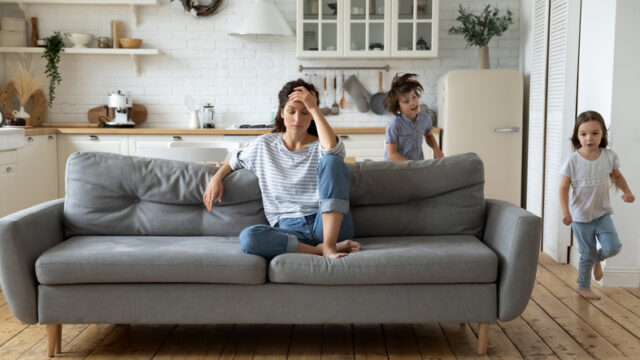Your home should feel like a safe space, but sometimes, it becomes more overwhelming and stressful than the outside world.

From clutter to lighting to weird little habits you’ve stopped questioning, your environment can have a bigger impact on your mental state than you think. If you’ve been feeling tense, tired, or mentally cluttered lately, your home setup might be playing a part. Here are a few ways it could be making you anxious and unhappy without making it obvious.
1. There’s too much clutter everywhere.

You might tell yourself you’re used to it, but visual clutter constantly pulls your brain’s attention in different directions. Even if you’ve trained yourself to ignore it, your nervous system hasn’t. When every surface is covered or things are scattered out of place, your mind never gets a break. A tidy home doesn’t have to be spotless, just a little less overwhelming to look at.
2. You’re not getting enough natural light.

Dim, stuffy rooms might seem cosy, but if your home is dark most of the day, it can mess with your mood more than you realise. Light helps regulate your body clock, energy, and even sleep. If you rarely open the curtains or don’t get much sun where you live, try rearranging a space so you’re closer to the windows or adding a daylight bulb to brighten things up.
3. Your home is too quiet, or too loud.

Some people need background noise to feel calm, while others need stillness. If your space doesn’t match what your brain finds soothing, you might end up feeling irritable or overstimulated. It’s worth noticing how noise affects you. Maybe you’d feel better with music in the background, or maybe you need better soundproofing to block out external chaos. Your nervous system picks up on it, even when you don’t.
4. There’s no space that feels truly yours.

When every room in the house is shared or multipurpose, it can feel like you never really get a break. You might love the people you live with, but not having a space to retreat to wears you down. Even if it’s just a chair in the corner or a section of the kitchen you claim as your own, having a little “you-only” space makes a difference. It’s about creating somewhere you don’t have to be “on.”
5. You’re always reminded of unfinished tasks.
 Source: Unsplash
Source: Unsplash If your environment is full of visual reminders—laundry piles, half-finished projects, unopened mail—it can feel like you’re constantly behind. Even if you’re resting, your brain’s still ticking through a to-do list. Clearing or hiding those reminders, even temporarily, can make your downtime feel more restful. You deserve to sit in a space that isn’t constantly shouting at you to get up and do more.
6. You never fully unplug in your own space.

When work, relaxation, meals, and scrolling all happen in the same spot, your brain doesn’t get the message that it’s time to wind down. Over time, this lack of separation leads to low-key burnout. If possible, set up zones, even mental ones. Have a spot where you relax without your phone, or light a candle when you’re done working for the day. Those small cues help your brain switch gears.
7. The air feels stale or heavy.

Air quality makes a big difference to how you feel. Stale air, strong smells, or a space that’s never aired out properly can affect your concentration, mood, and even your sleep. Opening windows for even ten minutes a day, adding a plant, or using a diffuser can help reset the atmosphere. You don’t need a total overhaul, just a little more freshness in the mix.
8. Your furniture arrangement is subtly frustrating.

If you’re always bumping into things, squeezing through tight spots, or awkwardly turning just to grab what you need, it slowly chips away at your patience, even if you don’t consciously notice it. Making your space easier to move through and more intuitive to use can lower stress without needing to buy anything new. Sometimes, a small shift in layout is enough to make daily life flow more smoothly.
9. You don’t have a consistent bedtime setup.

Even if you’re tired, your brain needs signals to wind down. If your room is chaotic, your lighting’s too bright, or your bed is covered in stuff, your sleep is going to suffer. A calming wind-down routine—like dimming the lights, fluffing pillows, or even just clearing the bed—can train your mind to associate that space with actual rest. That consistency matters more than perfection.
10. Your decor doesn’t reflect who you are anymore.

Sometimes your space looks like a version of you from five years ago. When your home doesn’t match where you are now, it can subtly make you feel disconnected or stuck. You don’t need a full makeover. Swapping out a few photos, updating colours, or adding a personal touch you love can make your space feel more like a reflection of who you are now—not just who you were.
11. You never feel “done” for the day in your own home.

If you’re always finding one more thing to do—tidy up, prep for tomorrow, respond to messages—it’s no wonder you feel on edge. A home should help you recharge, not keep you in go-go-go mode. Having a small ritual that marks the end of your day—like turning off a lamp, putting on comfy clothes, or even making a cup of tea—can help your brain transition from productivity to rest.
12. You don’t feel emotionally safe in your space.

Whether it’s a tense living situation, unresolved tension, or just a vibe that feels off, emotional safety at home is everything. If you can’t fully exhale where you live, your stress will stay with you. That doesn’t mean everything has to be perfect—but you deserve a space where you can relax without walking on eggshells. Even one small step—like rearranging a space or setting a gentle boundary—can make a big difference.




